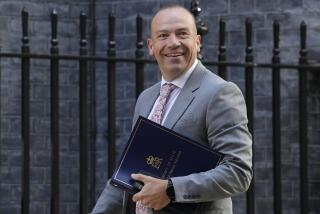Carnage in Northern Ireland
- Share via
Several days ago, on the road between Omagh and Ballygawley in Northern Ireland, a massive bomb blew up a bus full of British soldiers. The Irish Republican Army claimed responsibility for the explosion, which killed eight soldiers and wounded 28. One witness to the carnage said, “It was something I have never ever seen before and never ever want to see again.” Yet the killing continues. More than 2,600 people have lost their lives during the last two decades of violence.
Sixty-eight years ago, in 1920, the IRA rejected the agreement that gave birth to an independent Irish Republic but left the six Protestant-dominated northern counties under British rule. Ever since, with varying intensity and violence, the IRA has fought a guerrilla war aimed at ending British administration in the north. A year ago it was thought that the war-weary underground group was considering putting more of its energies into political activity rather than violence. But since the beginning of the year the IRA has launched a new campaign of terror, focusing on off-duty British troops.
Yet the macabre scenes of violence that flash onto the television screen don’t tell the whole story. There has been some progress toward peace in Northern Ireland over the last several years. Most important is the Anglo-Irish Agreement of November, 1985, which allows Britain to retain sovereignty over the province unless a majority of its 1.6 million citizens decide otherwise. This protects the interests of the Protestants, who outnumber the Roman Catholics 2 to 1. At the same time, the agreement ended the political isolation of the minority Catholic community and gave the Irish Republic a formal role in Northern Ireland’s affairs. About the only thing that Protestant and Catholic extremists agree on is their opposition to the Anglo-Irish accord--all the more reason to renew the pact this fall.
Peace will not come to Northern Ireland until the British push ahead to remove the grievances felt by the Catholic minority. There must be progress on the issues of job discrimination (unemployment is twice as high for Catholics as for Protestants), equal access to housing and education, and judicial fairness. On the matter of political representation, Protestants must be persuaded to accept some type of power-sharing agreement--the principle of one man, one vote is unfair to the Catholic minority. Finally, there must be increased representation of Catholics in the Royal Ulster Constabulary, the main police force in Northern Ireland. If there is significant progress toward these goals, the IRA will have a tougher time recruiting a new generation of fanatics.
Nineteen years ago this month British troops were first dispatched to Ulster to restore public order. But having the British army act as peace-keeper in Northern Ireland is like pouring water on a grease fire--it makes the fire spread. Someday the British government will pull the army out of Ulster. Northern Ireland’s Catholics and Protestants will have an easier time of it if they start the difficult process of reconciliation now instead of waiting until the army pulls out.
More to Read
Sign up for Essential California
The most important California stories and recommendations in your inbox every morning.
You may occasionally receive promotional content from the Los Angeles Times.













